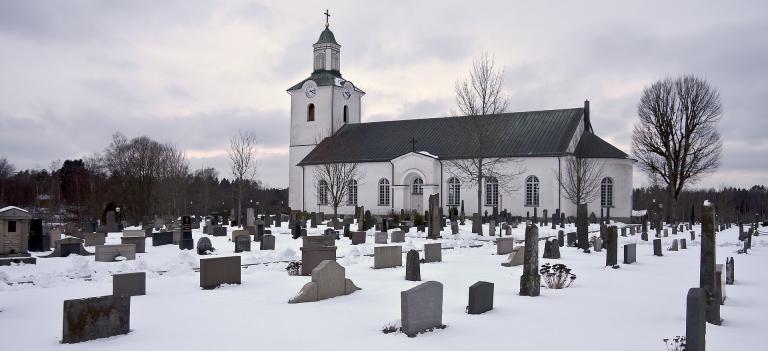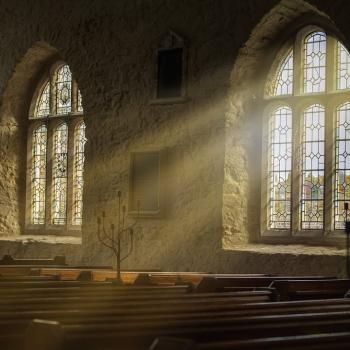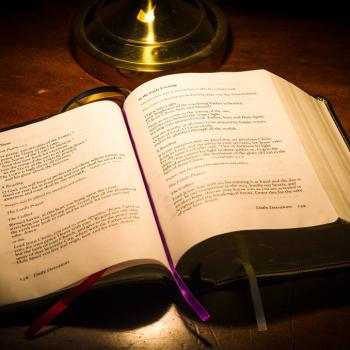 Several weeks ago the bishops of the United Methodist Church concluded their deliberations on the future of the United Methodist Church. With an eye to the 2019 General Conference, the bishops have been weighing how to navigate the thorny issues facing their church, concerning same sex relations and the ordination of openly gay clergy.
Several weeks ago the bishops of the United Methodist Church concluded their deliberations on the future of the United Methodist Church. With an eye to the 2019 General Conference, the bishops have been weighing how to navigate the thorny issues facing their church, concerning same sex relations and the ordination of openly gay clergy.
Before them were three options for resolving the dispute: The One Church Plan, The Traditionalist Plan and the Connectional Conference Plan. In the end, the Council of Bishops endorsed the One Church Plan, which is effectively what might be called a local option strategy. The One Church Plan liberalizes the rules that govern the church’s operation, making room for the ordination of gay and lesbian clergy, and – at the same time – creates a mechanism that allows both pastors and their congregations permission to decide whether they will or won’t cooperate with that liberalization. It is a plan that the church has considered in the past and rejected, and it is likely that the same parts of the church that opposed the plan in the past will oppose it again. That cohort evidently includes all of the Methodist bishops from Africa.
To further complicate matters, the bishops also brought the other two plans forward for consideration, and they left open the possibility that other plans could be offered from the floor of the convention. (In a subsequent meeting of the church’s Judiciary Council permission to for delegates to propose those alternatives.) The reports from both meetings suggest that this open-ended “recommendation” was finally necessary because the bishops themselves were unable to reach a unanimous consensus.
I have watched this process with interest because, although I am not a United Methodist, I do teach at a United Methodist seminary, and I owe a great deal to my early formation as a Christian to the United Methodist Church. I have also watched this debate play itself out in my own denomination (The Episcopal Church), so the similarities and differences between the two churches are interesting. Above all, however, I am convinced that the crisis facing United Methodists has a larger significance.
Two things are already clear and the latter has sweeping implications for Protestant churches: One, the case for and against a modification in the UMC’s polity has been made, and the positions on both sides of the question are unlikely to change. That was already clear and is clearer yet in the wake of the bishops’ decision. Both camps are fixed in their positions. They differ deeply on their reading of Scripture, and the arguments offered to defend by both sides invite the worst of partisan responses.
The other thing that is clear is this: It is no longer possible to lead Protestant churches without defection and schism. The second observation will require explanation. So, with an eye to its significance for the United Methodist Church and Protestantism in general, I would like to ask and answer this question: What does the Council’s decision tell us about the state of leadership in the United Methodist Church and, by inference, the state of leadership among Protestants in general?
Several observations by way of an answer:
The politics of the nation have become the politics of the church.
I have argued over the years that American churches were born hip to hip with the American Revolution. That point is not difficult to illustrate. Most Protestant denominations mimic our national and governmental structures. Bicameral legislative bodies are charged with decision-making. Like our federal government, American Protestants rely on a constitution of sorts. And, over the years, the national offices of Protestant churches have mimicked the evolution of the federal government, with ever-larger bureaucratic structures attaching themselves to it. That is so much the case that some historians of Methodist Church history even talk about the church’s culture as “constitutional,” without even a hint at how alien that language is to the church’s larger ecclesiology.[1]
But it is not just the formal provisions of our national life that shape modern Protestantism. Life in the American church is also dominated by the politics of leverage or what I have sometimes described as “politicking in purple.”
Following the lead of American voters, American Protestants have appropriated the politics of leverage over the last fifty years. In the sixties, those who dissented from the policy of the church resorted to civil disobedience. They sometimes acted in violation of church law in order to register their disapproval, but – like others who relied on civil disobedience – they acknowledged that they were subject to the sanctions that attached to those laws.
That chapter passed quickly, however, and Protestants now rely on a different kind of political leverage, practicing what might be called enacted defection. When they disagree with church law, they not only disobey it, they refuse to acknowledge the authority of the church to exact any penalty for disobedience, and they deny the authority of the church to act in accordance with its laws.
However, it is important to note that enacted defection is not just an approach that is unique to those who dissent from church law. It has also become the practice of those who may have once agreed with church law, but now find themselves at odds with the changes taking place. So, for example, traditionalists are already parting company with the church ahead of feared changes, or are threatening to do so. Both sides will offer different reasons for the positions that they occupy, of course, but the effect is the same.
As a result, the priesthood of all believers has degenerated into the priesthood of each believer.
Martin Luther never imagined a church that would divide so badly that the individual’s conscience or conviction would become the absolute center of each Christian’s existence. As David Yeago observes:
Luther’s mature thought defines the church as a tangible “Christian, holy people” within history, constituted by distinctive public practices. This church is necessarily institutionalized: the “universal priesthood” is corporate rather than individual, and cannot be fully realized without ministers acting in persona ecclesiae. Ordered ministry and common priesthood are interdependent and mutually constitutive. Finally, following his central principle that God gives spiritual gifts only through public, bodily means, Luther allows no separation of justifying faith from bodily adherence to the Christian people.[2]
But here we are. The epicenter of the church today is the individual.
The language, “the body of Christ,” is a theological gloss that we use to describe the corporate life to which individuals subscribe and offer their provisional allegiance. But that corporate life has no claim on the life of the individual that rises above that voluntary allegiance. It has no power of its own to inform the way in which we live as a church. It does not make claims that demand our allegiance, and the unity of the church is no longer important.
The language of ecclesiology (a theology of the church) has slipped to the margins. Instead, Methodists draw comparisons with Starbucks[3] and talk about the church’s “constitutional” polity, and everyone assumes that whatever needs to be done, it should take the form of national legislation.[4]
This behavior and this way of navigating decisions in the church is now the standard. There is little room for theological deliberation. There is even less room for theological struggle, and there is no room for pastoral care and attention to the individual or community.
That is, in large part, because both by design and by inattention the politics of the culture have invaded and overrun the life of the church as the body of Christ.
But we have yet to recognize how thoroughly compromised the life of the church really is.
Bishops regularly refuse to abide by the church’s polity. Pastors regularly part company with the guidance of their bishops.
But such decisions are never made in a vacuum and what neither bishops, nor pastors seem to realize is that if they refuse to abide by their church’s polity, then the laypeople have no reason to follow the leadership of their bishops and pastors. That reality is about to play itself out, parish by parish.
By selecting the One Church model, the Council of Bishops refused to lead, and by bringing all three proposals forward for consideration, they created an environment in which the church will continue to struggle. It is impossible to say with any certainty why the bishops have taken this course of action. It may be that the bishops felt obliged to build a “big tent” in order to accommodate as much diversity of opinion as possible. It may be that some are simply conflict averse. The process by which bishops are elected in most Protestant denominations today encourages this kind of behavior and can account for both motives.
But, at best, the process could be described as facilitating a debate or leadership by referendum. The decision to choose not to lead will be even more fractious than a more decisive approach — one way or the other — might have been. Everyone on both sides of the issue will have good reason to be frustrated with their bishops. The church will splinter anyway and the political climate that I described above will – in spite of the council’s efforts — foster bitter recrimination and defections.
Those who are conflict averse never stem conflict, they defer it or deflect it, and the result is always worse. In this case those on the receiving end of that behavior will be pastors and local congregations. Indeed, the One Church strategy makes that deflection inevitable.
What the Council currently refuses to do will become inescapable on the local level, and what the One Church plan does not acknowledge is that, proportionately, there is no more unanimity on the local level than there is on the conference level. So, the ugly drama that has been a part of life on the denominational level will be played out over and over again among pastors and their congregations.
So, what lies ahead is a lengthy, torturous future for our Methodist siblings, but what we may be witnessing is also the slow, torturous death of the Protestant Reformation.
There are those who theorize that all great movements run their course in 500 years. There is nothing magical about such numbers, but the theory may apply in this case. It is difficult to imagine a future for the United Methodist Church that does not end in schism, and – deeply wed to the politics of the nation – it is difficult to imagine a form of Protestantism that will not be roiled, generation after generation, by the politics of leverage. What is missing and what seems almost impossible to reclaim is language about the church as the body of Christ.
Two of the commitments that might have made that reclamation possible and that have sustained the Benedictine Order for over 1500 years have been the vows of stability (commitment to a place) and obedience to spiritual authority. Those vows have freed Benedictine monasteries to be faithful to their vocation, whatever the challenges; and, over the centuries, have bolstered Benedictine life, even when historical developments have threatened the very existence of monasteries in one place or another.
Both commitments are missing from the contemporary Protestant church. Its membership cannot agree on what that “place” is to which they belong. The factions within Protestantism cannot agree on the nature of “spiritual authority,” and there is no longer a vow that would that would hold the church together other than the individual’s assent to participate in its life and that assent can be revoked at any moment.
Perhaps that is why John Henry Newman, who was once an Anglican, attempted to fend off anyone who might have followed him into the Roman Catholic Church who did not first commit wholeheartedly to its authority. Writing to one correspondent, he cautioned:
The greatest trial a Convert has to sustain…is the strangeness at first sight of everything in the Catholic Church…You must be brave and determined, and resolutely beg of God’s grace to carry you through your difficulties…the question is where is religious Truth, where is salvation? – not is this habit, this fashion pleasant to me or not?[5]
In a church where that last question becomes the most important one, life comes unraveled.
Where does this take us? Nowhere good, I am afraid.
Earlier this century there was considerable conversation about a new degree of unity across denominational divides. Now we are headed firmly in the opposite direction. Earlier in the century some held out hope arguing that the church has both a calling and a responsibility to live and act from theological principles that are alien to the priesthood of the individual and the politics of leverage. Now, the priesthood of the individual and the politics of leverage are all there is. Earlier in the century it was possible to believe that one could argue, as Dietrich Bonhoeffer did after visiting Rome for the first time, that if the church is not universal in its embrace, it is not a church at all.[6] Now, the dominate voices on both sides of the debate are calling for schism, one side contending for orthodoxy, the other side contending for justice.
The DNA of division was there from the beginning and it will dictate the shape of the future.
[P.S. Some conclusions are unwelcome, even when they are your own. I count this series of observations among the most unwelcome of all in my own experience.]
[1] Cynthia B. Astle, “The Stakes are Higher in 2019 than We Thought,” United Methodist Insight (May 30, 2018): http://um-insight.net/perspectives/the-stakes-are-higher-in-2019-than-we-thought/
[2] David S. Yeago, “’A Christian, Holy People,’ Martin Luther on Salvation and the Church,” Modern Theology 13.1 (January, 1997): 101-120. The quotation is from the abstract.
[3] Christy Thomas, “Starbucks, Inclusivity and The United Methodist Church,” United Methodist Insight (May 31, 2018): http://um-insight.net/perspectives/christy-thomas/starbucks-inclusivity-and-the-united-methodist-church/
[4] Astle, “The Stakes are Higher,” passim.
[5] John Henry Newman to Miss Ellen Fox, February 25, 1868 in The Letters and Diaries of John Henry Newman, vol. 24, ed., Charles Dessain, et al. (London: Nelson): 41.
[6] Eric Metaxas, Bonhoeffer: Pastor, Martyr, Prophet, Spy (Nashville: Thomas Nelson, 2010): 53ff.












